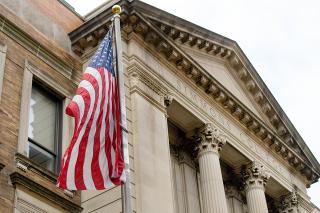Ambassador (ret) William M. Bellamy, Warburg Professor of International Relations, shares his thoughts on the passing of the late Senator John McCain.

The news was expected, but when Senator John McCain died last week the collective gasp in Washington was almost audible. Whatever one thought of McCain — and by the end an astonishing 59% of Republicans had pivoted to President Trump’s jaundiced view of him — no one disputes that he was unique. His fierce patriotism, his personal courage, his willingness to break ranks time and again and stand alone on principle set him apart from virtually every other lawmaker in Washington — Democrat or Republican.
Earlier this summer I had been thinking about McCain as I traveled to Zimbabwe with a small delegation of former U.S. ambassadors and officials. We’d been asked by a Washington-based foundation to assess the political climate in Zimbabwe on the eve of that country’s first election following the military coup that had deposed longtime tyrant Robert Mugabe. We were hoping to find that Emmerson Mnangagwa, Mugabe’s former vice president and security chief, was sincere in his promises to end the violent and corrupt misrule of his former boss.
Years earlier I had attended a dinner in Washington co-hosted by McCain and Madeleine Albright to honor another Mugabe opponent, trade union leader and democracy activist Morgan Tsvangirai. Tsvangirai had been arrested, beaten, tortured and nearly killed by Mugabe’s agents more than once. He had come to the U.S. desperately seeking aid for Zimbabweans struggling to restore the rule of law. McCain listened intently then rose to tell Tsvangirai that he would have America’s full support. The room erupted in applause. McCain knew without asking that the White House would back him. Madeleine Albright stood at his side beaming. It was as if a sword had been placed on Tsvangirai’s shoulder and he’d been told to arise and go forth to battle.
McCain believed it our duty to stand up to despots wherever we can, and to export the best of our political values to those struggling against tyranny. For the Arizona senator, there was no room for partisanship in this or any other important foreign policy or defense issue. Back then the International Republican Institute (IRI) which he headed and the National Democratic Institute (NDI) led by Albright were shining emblems of bi-partisanship in foreign policy. This is what President Reagan intended when he urged Congress in 1982 to “foster the infrastructure of democracy” by creating these bodies. Today IRI and NDI represent competing parties but share the same vision and mission to advance democracy abroad.
McCain believed it our duty to stand up to despots wherever we can, and to export the best of our political values to those struggling against tyranny.
IRI and NDI were already on the ground when our little party landed in Zimbabwe. Their joint monitoring mission would ultimately help judge the credibility of the election. For five days we consulted intensively. On our last day, a promised meeting with President Mnangagwa failed to materialize. The President of a small but very rich oil-producing African state had arrived unexpectedly aboard his personal Boeing 777. With Zimbabwe bankrupt and its ruling elites hungry for cash, Mnanagwa’s schedule change was understandable.
We had listened, questioned and heard enough to conclude reluctantly that Mnangagwa was not a real reformer, though he needed to masquerade as one to obtain debt relief and new foreign loans. The July 31 election would not be free, fair or credible.
That was the gist of the conclusions we conveyed in Washington. It was at our meeting with Senators Coons (D-DE) and Flake (R-AZ) that I was reminded again of McCain. Coons and Flake rarely voted the same way. But together with Senator Booker (D-NJ) they too had traveled to Zimbabwe and were considering amendments to laws sanctioning Zimbabwe. They were eager for our readout.
I watched Coons and Flake banter while they questioned us and mused together about the best course of action for the Senate. It was a McCain moment, with Republicans and Democrats laboring together to defend our values and interests, whether on small issues like Zimbabwe or big ones like Russia, NATO or North Korea. I wondered: with McCain gone, who is left to lead and inspire? Regrettably, it will not be the disheartened Flake who will quit the Senate this year. On the Republican side, there are no McCains left. Among Democrats, no one of his stature or authority is in sight.
As for Zimbabwe, the election was indeed deeply flawed and followed by deadly violence against protestors. Coons, Flake and Booker successfully sponsored legislation to tighten U.S. sanctions on Zimbabwe. Zimbabwe’s beleaguered reformers are again looking to America for inspiration and support. They too will miss the senator from Arizona.

